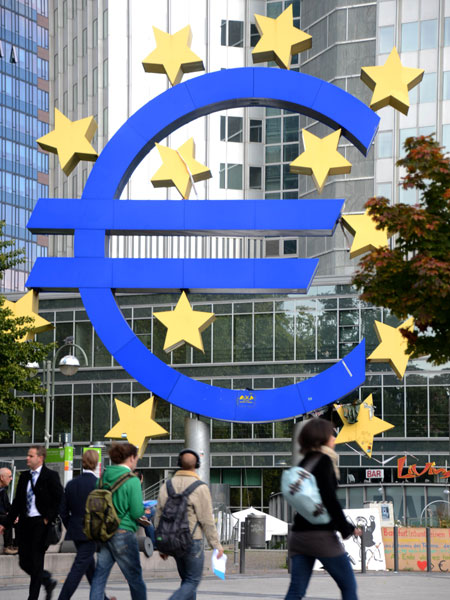
Chinese central bank official reiterates nation's confidence in future of the euro
Chinese investors are showing interest in the European Stability Mechanism, the latest European bailout fund, a top European Union official said on Monday.
|
 |
|
A giant logo of the euro currency standing in front of the European Central Bank in the banking district of Frankfurt, Germany. [Photo/Agencies] |
Meanwhile, a Chinese central bank official has pledged that the country remains confident about the future of the euro.
The remarks came weeks after the EU officially adopted the first permanent weapon it will use against the severe financial troubles that have beset the region in the last four years.
During a recent road show to China, the fledging 500 billion euro ($650 billion) fund garnered investment interest from China's four main State-owned banks, financial institutions and large State-owned enterprises, according to Marco Buti, director-general for economic and financial affairs at the European Commission, the EU's executive body.
"Based on the experience of the fund's predecessor, the European Financial Stability Facility, we are confident about issuing these bonds, as we had no problem (selling them) even during more difficult periods," he said.
The road show team was led by top European officials, including the head of the European Stability Mechanism, and formed by the European Union and a German bank. While the Chinese government was not directly involved in organizing the team, some of the participants in it deal regularly with the People's Bank of China, the country's central bank, on issues related to foreign exchange.
Meanwhile, Feng Runxiang, deputy director of the international department at the central bank, said the Chinese government supports the EU and has regularly exchanged opinions with the European Central Bank and with individual countries' central banks.
"We believe that the current troubles are temporary, for any new currency must go through a difficult period before it can genuinely become an important global currency," Feng said in a speech at Fudan University in Shanghai.
"China continues to have confidence in the future of the euro."
Proposed two years ago by eurozone ministers and officials, the European Stability Mechanism is an intergovernmental institution established under international law by a treaty signed by the 17 members of the eurozone.
The fund is the first of its kind into which the members will pay the initial money that is to aid in bailouts. The European Financial Stability Mechanism had only provided government guarantees.
The fund is expected to initially collect 80 billion euros by 2014. Each participating government will contribute an amount proportionate to the size of its economy.
Explaining the system, Buti said the 500 billion euros the fund can lend out will be raised by selling bonds in the open market. The initial government contributions are to act as the collateral in those deals.
But "whether the (European Stability Mechanism) will soon be in a position to lend to troubled sovereigns depends primarily upon market appetite for the bonds," Mujtaba Rahman, an analyst at the Eurasia Group was quoted as saying by The New York Times. "This is the biggest unknown."
Buti said the EU will use its European Council meeting on Thursday and Friday as an opportunity to assess proposals to make the European Central Bank the single supervisor of the European banking system.
"The financial crisis has exposed major weaknesses in the design and implementation of EU's existing economic governance," he said.
"Strengthened fiscal, macroeconomic and macro prudential surveillance is essential to guard against destabilizing cross-country spillovers."
Premier Wen Jiabao told German Chancellor Angela Merkel in September that China might buy more European government bonds.
Li Daokui, a former adviser to China's central bank, said the eurozone's debt troubles will not lead to the end of the euro, saying the region has no choice but to solidify its economic and political foundations.
He was quoted by Xinhua News Agency as saying that European countries will eventually adopt reforms to achieve further integration. He also urged Europe to have a flexible monetary policy and to transfer part of southern European countries' fiscal power to the European Union.
 Audi: Local models, not price cuts, hold the key
Audi: Local models, not price cuts, hold the key Toyota to recall 1.4m cars in China
Toyota to recall 1.4m cars in China Overseas energy projects get green light
Overseas energy projects get green light Use of RMB as settlement currency rise
Use of RMB as settlement currency rise